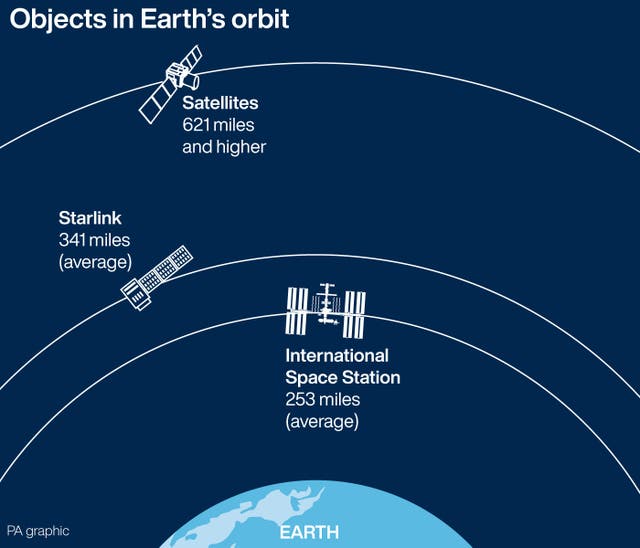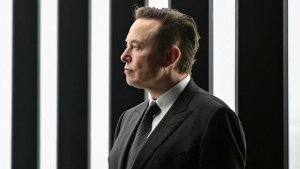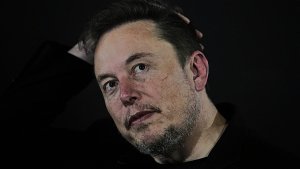With more than 1,000 Starlink satellites now in orbit, dreams of rural areas receiving broadband speeds similar to cities could become a reality.
Rural Users Testing Elon Musk’s Satellite Broadband Reveal ‘Amazing’ Improvement
With more than 1,000 Starlink satellites now in orbit, dreams of rural areas receiving broadband speeds similar to cities could become a reality.

People in rural areas of the UK have reported huge jumps in speed after switching to Elon Musk’s satellite broadband service.
Early testers claim to have achieved download speeds of up to 215 megabits per second (Mbps), making common activities like streaming possible from multiple devices at the same time.
In contrast, some users say their traditional broadband would often lag between 0.5 and 1Mbps, only capable of basic tasks such as email.
Aaron Wilkes, who lives in Bredgar, Kent, told the PA news agency his household’s fixed line should achieve about 20Mbps – significantly less than the 71.8Mbps national average reported by Ofcom for May 2020.
#starlink #uk #beta Time to power up and hit some high speeds! pic.twitter.com/rWs5zRgZEh
— Aaron (@HazardOnTrack) January 25, 2021
“We moved up to this small village and it was an absolute ball ache when we got our slow connection here,” he said.
Using Starlink, he receives an average of 175Mbps, and up to 215Mbps, meaning games can be downloaded in little over an hour.
On a previous occasion, a game started downloading at the snail’s pace of 0.5Mbps, so he “gave up because there was no point”.
“The ability to be able to download content so quickly compared to our standard BT line is amazing,” said Mr Wilkes.
Mr Musk’s SpaceX company has already launched more than 1,000 satellites into Earth’s orbit as part of its Starlink programme, which aims to beam high-speed internet to those left behind by traditional cable-based providers.
But this is just the beginning of the project – Mr Musk reportedly wants to have tens of thousands of his satellites in space eventually, enabling a seamless connection for all users.
Testing of Starlink was recently opened up to UK residents desperate for a better connection in certain parts of the country, while other areas have been told to expect coverage arriving sometime in mid to late 2021.

However, it does not come cheap, at £439 for the hardware and a monthly cost of £89.
Plus there are planned outages due to the limited number of satellites and the fact that Starlink is still in early testing.
But those who have suffered with sluggish internet say it is a price worth paying.
Martin Langmaid set up his mother’s home near the Devon village of Dunsford with Starlink because she needed it to run her businesses.
“She moved into the countryside to be nearer to my brother, who is a farmer,” he told PA.
“Modern-day business requires internet, you can’t get away from it, so that’s what she needed.
“If you need connectivity to run a business and if you need connectivity for communication, particularly in Covid times, £90 a month is quite justifiable.”
However, he said they are using a mix of Starlink and 4G, as the satellite outages have an impact on real-time tasks like video conferencing.
“I think a lot of people will do something similar, where they will leave their DSL (digital subscriber line) in place at the moment or have 4G, combine it with Starlink, and, once Starlink has the capacity there, the outages should ultimately disappear once the coverage is in place, then that’s when I think people start cancelling things like DSL and 4G dongles,” Mr Langmaid told PA.
Mr Wilkes, on the other hand, is waiting for his landline contract to end so he can cancel it completely.
“I’ve not touched it (the fixed line); everything has been switched over – Sky TV, all the Alexas, phones, tablets, are all now over on Starlink,” he said.
“The interesting thing is, over the months I’ve had it I’ve gone from having 127 minutes of downtime, probably down to about four to five minutes a day now.
“And that’s usually overnight when they’re doing updates so you don’t even see it.”
Speed will double to ~300Mb/s & latency will drop to ~20ms later this year
— Elon Musk (@elonmusk) February 22, 2021
Mr Musk said on Tuesday that he expects Starlink’s speed to double to around 300Mbps and coverage for “most of Earth” by the end of the year, followed by “all” in 2022.
Existing providers seem to be considering satellite as a possible answer for rural areas too, with BT in early talks with Government-backed satellite firm OneWeb.
Ofcom believes that around 190,000 premises are unable to receive a decent broadband service.
Thanks for signing up to Minutehack alerts.
Brilliant editorials heading your way soon.
Okay, Thanks!

